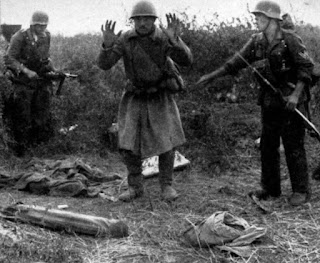On April 8, 1944, Russian forces led by Marshal Fyodor Tolbukhin attack the German army in an attempt to win back Crimea, in the southern Ukraine, occupied by the Axis power.
The attack would result in the breaking of German defensive lines in just four days, eventually sending the Germans retreating.
By 1944, the German position on the Eastern Front was precarious. The Luftwaffe had lost air superiority, and the Red Army had the armored and mechanized formations to conduct sequential deep operations along the Eastern Front.
Hitler argued with his generals when they proposed tactical withdrawal in the face of emerging operational disasters.
In this context, the German 17th Army supported by Romanian troops found the defense of Crimea becoming increasingly untenable. Soviet forces had in November 1943 cut the Peninsula’s land lines of communication, making naval and air resupply the only available alternatives.
By early 1944, Soviet infantry had landed at Kerch, and by April Fremde Herre Ost was reporting major Soviet concentrations against Perekop and the Sivash.
General der Pionierie Erwin Jaenicke, commander of the 17th Army and Army Group “A” before the launching of the Soviet offensive, proposed the organization of a naval evacuation of the Peninsula.
However, Hitler refused because he saw a naval and air threat to the Romanian oil fields and was concerned that the loss of Crimea might bring Turkey into the war against Germany.
The Soviet offensive for the re-conquest of Crimea began on April 8th, 1944. The Soviet attacking forces included the 4th Ukrainian Front supported by the Black Sea Fleet and naval aviation, the 4th Air Army, Separate Coastal Army, and Soviet partisan detachments.
Stavka had devoted five months to planning the assault on Crimea and entrusted the planning to Marshal Aleksandr Vasilevsky who, along with Marshal Zhukov, had been the architect of the Stalingrad Counter-Offensive.
The Soviet advance against the 17th Army was quite rapid, but Hitler saw Sevastopol as another fortress which would break the Red Army and refused to begin a naval evacuation.
Within a month, Fortress Sevastopol had fallen. A last ditch evacuation saved some of the German and Romanian troops, but Axis losses were significant and could not be replaced.
Crimea was the territorial plaything of many great powers, from the Ottoman Turks to the Russia of Ivan 2. It had declared its independence in 1918 but was occupied again by Germany in 1941.
It was “liberated” by the Russians, only to find itself trapped within the greater Soviet Union.
It once again declared itself an independent republic in the 1990s. The Crimean Peninsula was annexed by the Russian Federation between February and March 2014.







No comments:
Post a Comment